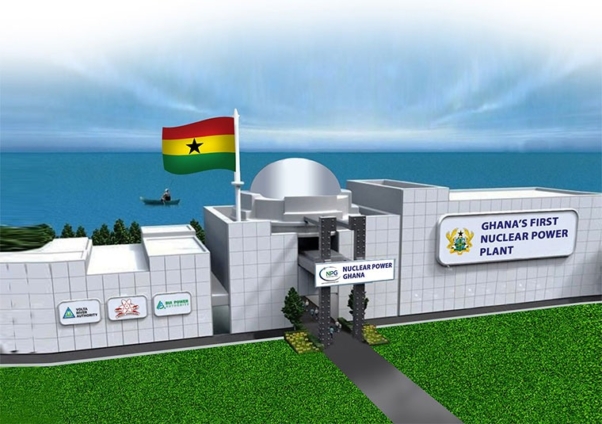The Ministry of Energy has announced that Ghana will by the end of 2024, select a vendor for the establishment of the country’s first nuclear power plant, expected to be operational by 2030.
Dr Robert Sogbadji, Deputy Director of Power (Nuclear and Alternative Energy) made this disclosure on the side-lines of a policy dialogue to mark world sustainable energy day in Accra on Tuesday, March 5.
It was organised by the Centre of Excellence in Public Utility Regulation (CEPUR), a brainchild of the Public Utilities Regulatory Commission (PUCR) and the Ghana Institute for Management and Public Adminstration (GIMPA).
“We’re currently in phase two of our nuclear power programme, and by the end of this year, we should be able to announce our vendor company to build our first nuclear power plant, which we foresee to be in the energy mix by 2030,” Dr Sogbadji said.
“So, by 2030 or 2032, we would have advanced strongly towards meeting net zero and meet energy transition goals,” he said.
On the country’s US$561.9 billion financing requirement for energy transition, Dr Sogbadji said the government had outlined a strategic plan to get about 46 per cent from the private sector.
Mr Herbert Kraper, Deputy Minister of Energy, said the country’s energy transition agenda was on course, with a clear strategy to rake in more investments in that regard.
To that effect, he said the country had developed pipeline projects, such as 2,000 megawatts of solar and wind energy to attract the required financing from various investors.
“We’re also looking at attracting green guarantees [concessional capital] from the private sector, patient caption, grants, and philanthropic funds to be able to transition,” the Deputy Minister said.
Mr Krapa stated that the government was “scaling up domestic currency, and that, together with carbon capture utilisation technology, electronic vehicles, which will contribute to about 40 per cent decolonisation, green hydrogen - 12 per cent, to catch up with the transition pathway we’ve developed for ourselves.”
Mr Kwame Jantuah, Chairman, Oil and Gas sector, Association of Ghana Industries, called for a fine balance between conventional (hydro), solar, and nuclear power for sustainable electricity for households and businesses.
“We should have a policy where we’ll say that a lot of residential users should have solar panels, which will cut down the cost of conventional, then we move the conventional to industry before we add nuclear,” he said.
“When that happens, the extra that the residential users produce can be added to the mix for export.
Mr Jantuah said it was important for the vendor selection to be left in the hands of the nuclear energy body, rather than being under the office of the President.
“The moment it goes under the presidency, then you’ll see politics coming in,” especially at a time that there is high interest from countries like France, United States of America (USA), Russia, and China.
Ghana is looking at a large reactor (1,000-1,200 megawatts) and a small modular reactor (about 300 megawatts) for its nuclear power plant, which is to serve as a clean baseload for the country’s industrialisation agenda.
The plant is to produce affordable electricity in a safe and environmentally friendly manner for socio-economic development, and in line with the Sustainable Development Goals (SDG) seven and 13.
Latest Stories
-
‘Menstruation is not a taboo’: North Tongu DCE champions dignity and access for girls
13 minutes -
Revoking Nyaho-Tamakloe’s ‘founding member’ status likely to be considered at NPP NEC meeting – JFK
29 minutes -
Wontumi arrest: Posterity will judge you – Afenyo-Markin tells NDC
51 minutes -
Wontumi arrest: JFK condemns Dr. Nyaho-Tamakloe’s ‘Where is NPP Chairman’ comments
56 minutes -
Bawumia calls for calm amid Wontumi’s detention
1 hour -
Two dead, others injured in Juaso-Nkawkaw Highway crash
1 hour -
We’re disappointed we didn’t see Wontumi – Dr Bawumia
1 hour -
GH₵50m bail deliberately set to block Wontumi’s release – Bawumia
1 hour -
Ashanti Peace Council urges stakeholders to uphold law and protect national peace
2 hours -
Equipping future healthcare professionals: Cassona Global, Mindray provide free practical training for ATU students
2 hours -
Bawumia, Minority Leader, granted access to Wontumi as tensions mount over detention
2 hours -
World Menstrual Hygiene Day: Terry Yegbe Foundation and Groomdatgirl champion menstrual health education at Horti EP Primary
2 hours -
Watch how Bawumia was forced through violent scuffle as NPP supporters clash with Police
2 hours -
NPP currently has no leadership; where is the Chairman? – Nyaho-Nyaho Tamakloe quizzes over Wontumi arrest
2 hours -
Tensions rise as NPP supporters besiege NIB headquarters over Wontumi’s transfer
2 hours

